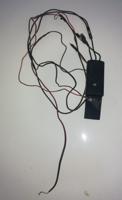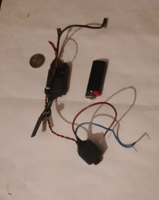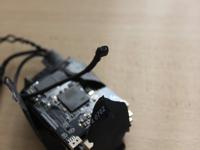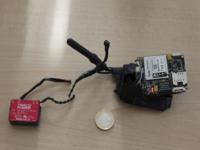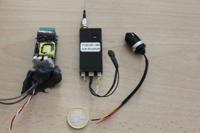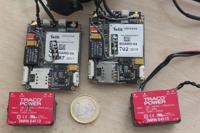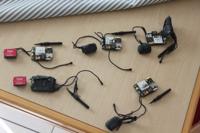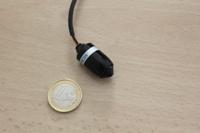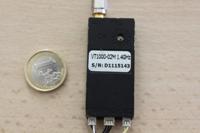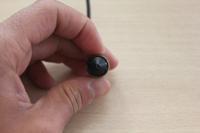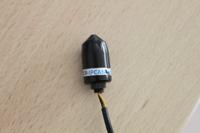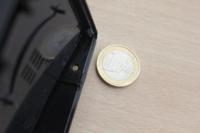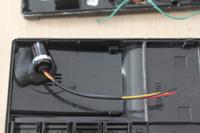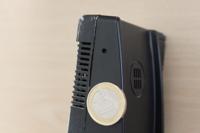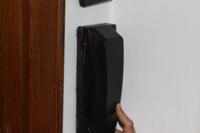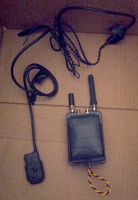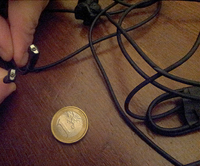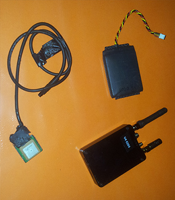A surveillance device was found in a car. It was located on the driver's side, at the bottom left, next to the seat. It was equipped with a SIM card, a 32 GB memory card, a GPS module and two microphones, one under the driver's seat and one near the seat belt, both on the same side. It was powered by cables located under the steering wheel.
Two surveillance devices were found in a car. They were located under the car upholstery. They were equipped with microphones, a GPS tracker, and a SIM card. They were connected to the car battery with a cable.
A microphone was found in a house. The device was connected to the fridge electrical outlet. It included a microphone, two antennas and a SIM card.
A tracking device was found under a car. The battery-powered device was attached with strong magnets under the car body, in the rear, just past the bumper.
A microphone was found in a house.
A microphone was found in a car. It was hidden inside the vehicle. The night before the device was found, one of the car's windows was broken, a few things inside it were stolen, and four men were seen tampering with the vehicle — the theft was presumably a cover-up for the device installation.
A GPS tracker and a microphone were found in a car. The device was attached with strong magnets. It contained a SIM card.
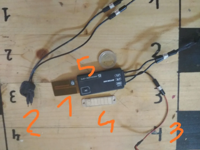
A microphone was found in an apartment. It was hidden on the back of the kitchen oven. It was powered by the oven electrical supply, and was also equipped with a battery.
A microphone was found in a building. It was located inside a power outlet. It was equipped with a microphone, two antennas, a SIM card, a memory card and a battery.
A tracking device and two microphones were found in a car. The tracking device was connected to the power supply of the control unit underneath the steering wheel on the left side. It was attached with a magnet, tape, and insulating fabric. The microphones were located at the end of a long cable running from the inside of the internal side pillar linings of the windscreen to the underside of the roof of the car. The tracking device used the GLONASS positioning system, and consisted of an antenna connected to a multi-frequency receiver box containing a micro SIM card.
Four microphones were found in a house. There was one in each room of the house. They were connected to the electrical system of the house using a transformer and a battery. Each device was equipped with a SIM card and a memory card.
According to the source that reported the discovery of the microphones, they were supplied by the Italian company Lutech.
Microphones were found in a building. They were connected to the electrical system of the building.
According to the article that reported the discovery of the microphones, they were supplied by the Italian company Lutech.
A microphone and two GPS trackers were found in a vehicle. A first tracker was attached with a magnet to the rear bumper, on the right side. The other tracker, along with the microphone, was located in the air vents located between the windscreen flap and the windscreen. The first tracker included a SIM card and an accumulator made of five 3.6 V lithium batteries connected in a series. The other tracker was equipped with a SIM card.
A surveillance device capable of recording images and sound was found during a gathering in front of a jail. It was located behind a few stones, in a wall along a path, wrapped in a black garbage bag. It was not the first time that a gathering took place there. The device contained a battery, a SD card, a microphone, and a camera hidden behind a rock in which a hole had been made. It seemed that the device couldn't send the recorded data, which was stored on the SD card. An analysis of the content of the SD card showed that the device was activated on June 3 and was installed on the afternoon of June 7, the day before the gathering.
The pictures of the device show that the device included a digital video recorder of model “DK-PV500E”, marketed by the Italian company DSE (Digital Surveillance Equipment). This suggests that the device was supplied by the Italian company DSE.
Microphones were found in a building. They were located in the kitchen.
Six microphones and a camera were found in a house. The microphones were located in electrical outlets and switch cases, one above the intercom in the corridor, two other in the living-room, and the three last ones in bedrooms. The camera was located inside the intercom in the corridor and connected to the microphone above it. Each microphone was equipped with a battery, and, except for the one in the corridor, with a SIM card and a memory card. The camera lens could observe through a small hole already present in the intercom structure and slightly modified to fit the device.
A microphone was found in a car. It was located in the upholstery of the vehicle roof. The device wires were hidden in the isolation case. The device was connected to the car electrical system, so that it turned on when the car started. It included a SIM card.
Two microphones and a GPS tracker were found in a car. The microphones were located above the driver's head, next to the junction of the car roof upholstery and the windscreen. The GPS tracker was located in the fuse box. Everything was powered by a connection to the headlights cable. The headlights were dysfunctional, seemingly because of the power supply required by the devices.
Two microphones and a GPS tracker were found in a car. The microphones were located inside the upholstery of the car roof, just above the driver's head. The GPS tracker was attached to the car body with a magnet. The devices were connected to the car power supply at the level of the pedals, just below the lever that opens the front trunk.
Two microphones were found in a house.
Two microphones and a GPS tracker were found in a car. The device was attached to the car body with magnets and connected to a cable carrying power to one of the lights inside the car. The microphones were attached with gum over the driver's and passenger's head seats. There was also a battery. The power cable, battery, microphones and GPS were all connected to a transmitter. There was a SIM card inside the transmitter.
Two microphones were found in a building. They were hidden inside a power outlet and in the junction box next to it.
Two microphones and a GPS tracker were found in a car. There was also a device equipped with an antenna, a SIM card and a 16 GB memory card. The microphones were located under the upholstery of the car roof and the wires reached the power supply through the car door. The power cable was connected to the fuse box and to other wires located under the dashboard. The magnetized GPS and a thing with an antenna and cards were hidden behind the speedometer. Everything had been seemingly installed in the car more than a year before the discovery and the microphones were recording even when the car engine was turned off, in a radius of several meters.
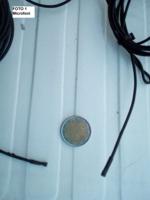
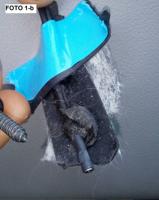
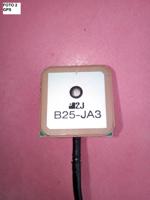
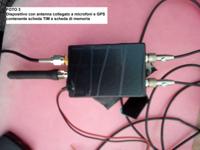
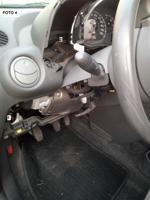
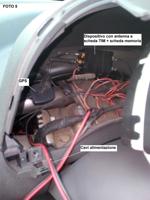

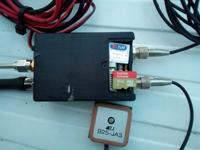
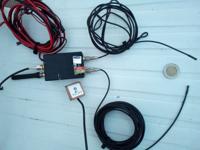
A GPS tracker was found in a car. It was located in the rear bumper, attached to the car body with magnets. It consisted in removable batteries and a SIM card.
Microphones and a GPS tracker were found in a car. They were located in the fuse box. The car had been having electrical problems (the battery had discharged twice in a month, sign of an abnormal electricity consumption), presumably because of the devices.
A micro-camera was found in a house. It was located in the kitchen/dining room, inside a wall, covered up by mortar, revealing only the hole for the camera's lens.
Microphones and GPS trackers were found in two cars.
Microphones and GPS trackers were found in a car. The microphones were located under the upholstery of the car roof, where the windscreen and the sun shields are. In one case the power cables reached beneath the wheel, in the other they were attached to the car lights.
A surveillance device was found in a building inside an outlet not connected to any electrical network. The acronym “ABG” was visible on one of its edges.
A microphone was found in a building. It was located inside a neon light attached to the ceiling. It consisted in three 9-volts batteries, joined together with insulating tape, with a microphone and antenna at each end.
Two microphones were found in a home. The devices were inside two electrical outlets. Each consisted in a microphone connected to a transformer, and a thing containing a micro-SIM card.
Three microphones with cameras were found in the alleys around a building. The devices were pointed at the different entries of the building.
The pictures of the devices show that the cameras were marketed by the Italian company Elkron (which became a subsidiary of the Italian company Urmet in 2012). This suggests that the cameras were supplied by the italian company Elkron.
Two microphones and portable scanners were found in a building and outside of it. The portable scanners were in a telecom booth close to the building. The microphones were connected to the electrical network of the building.
Two cameras were found in front of a building. They were hidden in a fake electric box of the Italian electricity supplier Enel, attached on the first floor of a building.
The logo of the Italian company Gruppo TRS, which was bought in 2012 by the Italian company Atet, is visible on the pictures of the cameras. This suggests that the cameras were supplied by the Italian company Atet.
Microphones were found in a building.
Four microphones were found in two homes. In the first home, a microphone was located next to the office where there was a computer (for some time, the loudspeakers connected to this computer were disrupted by an interference similar to the interference of a phone receiving a call), another in the outlet next to the kitchen table, and the last one in the bedroom, in the outlet closest to the bed (the outlet cover had been pierced to direct the microphone towards the headboard). In the second home, a microphone was located in the bedroom, in the outlet closest to the door leading to the kitchen, so that it covered several rooms. The first home's microphones included a transformer and antennas with a printed circuit board. The second home's microphone included two transformers and an antenna.
Two microphones and a GPS tracker were found in a car. They were located in the car ceiling. The device included SIM cards, a transformer, and antennas with a printed circuit board. The microphones were pointed towards the front seats.
Two microphones were found in a building. They were located in the air vents of two rooms of the building. Each consisted in three 9-volt batteries set up in parallel, attached with tape to a transmitter microphone.





A listening and geolocation device was found on a scooter. It was located in the spare wheel bracket, next to the tank and behind the horn grid. It was based on a device sold by Telit (an Italian supplier of wireless technologies). The device model was “Telit GM862-GPS”. It was capable of listening with a microphone, geolocating with a GPS antenna, and transmitting the collected information on the mobile phone network with a GSM antenna. The device was located in the spot where the tank is along with a transformer and an accumulator. Both antennas (GPS and GSM) were connected to the device and ended up in the spare wheel bracket. The microphone, also connected to the device, ended up behind the horn grid. Wires connected the device to the scooter starting system. All these components were attached to the scooter frame by strong magnets secured by tape. This scooter model doesn't have a battery (it dates back to the 1980s) and its engine generates alternating current, hence the presence of a transformer and an accumulator to power the device even when the scooter was not moving.
- Telit-GM862.pdf: product description of the Telit GM862-GPS device (in English).
Four microphones and a camera were found in a house. A microphone was located behind the fridge, another in the bedroom, another in a beam next to the ceiling light, another in the house entry. A small camera filmed the entry stairs. All were connected through a transformer to the house electrical network.
A camera was found in a school's air conditioner. It controlled the entrance of a house.
Microphones and cameras were found in a building. A first device was located in an electrical case that was abnormally hot. It consisted of a microphone and a micro-camera. A second device was located in an industrial outlet.
A microphone was found in a building. It was located inside a closed and sealed electricity meter. It was a microphone with a 300 MHz shortwave transmitter.
Microphones and a micro-camera were found in multiple homes. The devices were found in an amplifier, in the kitchen hood and in a cathode-ray television. They included microphones and 300 MHz transmitters with ranges of 200 to 300 meters. One of the devices could be activated by remote control (at a distance of hundreds of meters). Another device came with a micro-camera linked to a UHF band transmitter.
A microphone was found in a building. It was located inside an electrical outlet. It was a transmitter-receiver.
A GPS tracker was found under a truck. It was attached with a magnet under the back of the vehicle. It consisted in SIM cards connected to 4 “torch” batteries in a series.
A GPS tracker and a microphone were found in a car. The device was located between the car body and the interior coating, attached with two magnets. It was connected to the car power supply by the car interior light wires. It consisted in a modified mobile phone, an antenna, a GPS and a microphone.
A microphone was found in a building. It was located inside an electrical outlet.
A GPS tracker and microphones were found in a car. The device was located in a plastic container (badly) sticked under the roof. It contained two boxes, both of which included a SIM card. From there wires went out, through a hole, up to under the back seats. There were two microphones along the seat belt canal: the first at the driver's height, the second at the height of the levers used to adjust the seat, next to the back seats. The antenna was behind the back seat. Finally, still coming from these two boxes, a wire went through the car doors to reach the car fuse box.
A microphone was found in a home. It was hidden inside an air inlet. It consisted in 12 cylindrical batteries and a microphone.
Two receiver cases were found in the entry corridor of a building. They were hidden above a fake ceiling in the entry corridor. They were connected to the phone line with telephone wires. They consisted in a main unit with a remote-controlled connector, a digital receiver showing the strength of the received signal, and antennas. The presence of the two receivers presumably meant that there were two emitting microphones in the building.
Microphones were found in a car. The device was located in the car ceiling. It was connected to the car interior light power supply. It consisted in a modified mobile phone, an antenna and two microphones.
A surveillance device was found in the roof of a car. It was equipped with a microphone. It seemed that the device was causing interference that could be heard on the car radio.
A surveillance device was found in a car. It was located in the roof of the vehicle. It was equipped with one (or two) microphone(s). It was powered by sunlight. It seemed that the device was causing interference that could be heard on the car radio.

 English
English























